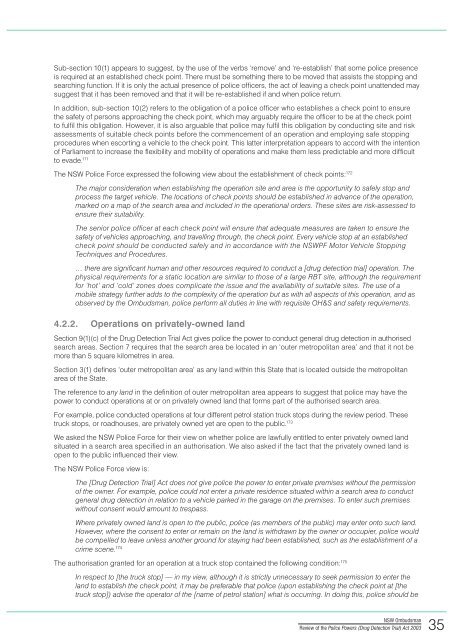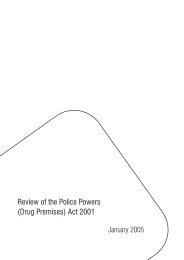Review of the Police Powers (Drug Detection Trial) Act 2003 - NSW ...
Review of the Police Powers (Drug Detection Trial) Act 2003 - NSW ...
Review of the Police Powers (Drug Detection Trial) Act 2003 - NSW ...
You also want an ePaper? Increase the reach of your titles
YUMPU automatically turns print PDFs into web optimized ePapers that Google loves.
Sub-section 10(1) appears to suggest, by <strong>the</strong> use <strong>of</strong> <strong>the</strong> verbs ‘remove’ and ‘re-establish’ that some police presence<br />
is required at an established check point. There must be something <strong>the</strong>re to be moved that assists <strong>the</strong> stopping and<br />
searching function. If it is only <strong>the</strong> actual presence <strong>of</strong> police <strong>of</strong>ficers, <strong>the</strong> act <strong>of</strong> leaving a check point unattended may<br />
suggest that it has been removed and that it will be re-established if and when police return.<br />
In addition, sub-section 10(2) refers to <strong>the</strong> obligation <strong>of</strong> a police <strong>of</strong>ficer who establishes a check point to ensure<br />
<strong>the</strong> safety <strong>of</strong> persons approaching <strong>the</strong> check point, which may arguably require <strong>the</strong> <strong>of</strong>ficer to be at <strong>the</strong> check point<br />
to fulfil this obligation. However, it is also arguable that police may fulfil this obligation by conducting site and risk<br />
assessments <strong>of</strong> suitable check points before <strong>the</strong> commencement <strong>of</strong> an operation and employing safe stopping<br />
procedures when escorting a vehicle to <strong>the</strong> check point. This latter interpretation appears to accord with <strong>the</strong> intention<br />
<strong>of</strong> Parliament to increase <strong>the</strong> flexibility and mobility <strong>of</strong> operations and make <strong>the</strong>m less predictable and more difficult<br />
to evade. 171<br />
The <strong>NSW</strong> <strong>Police</strong> Force expressed <strong>the</strong> following view about <strong>the</strong> establishment <strong>of</strong> check points: 172<br />
The major consideration when establishing <strong>the</strong> operation site and area is <strong>the</strong> opportunity to safely stop and<br />
process <strong>the</strong> target vehicle. The locations <strong>of</strong> check points should be established in advance <strong>of</strong> <strong>the</strong> operation,<br />
marked on a map <strong>of</strong> <strong>the</strong> search area and included in <strong>the</strong> operational orders. These sites are risk-assessed to<br />
ensure <strong>the</strong>ir suitability.<br />
The senior police <strong>of</strong>ficer at each check point will ensure that adequate measures are taken to ensure <strong>the</strong><br />
safety <strong>of</strong> vehicles approaching, and travelling through, <strong>the</strong> check point. Every vehicle stop at an established<br />
check point should be conducted safely and in accordance with <strong>the</strong> <strong>NSW</strong>PF Motor Vehicle Stopping<br />
Techniques and Procedures.<br />
… <strong>the</strong>re are significant human and o<strong>the</strong>r resources required to conduct a [drug detection trial] operation. The<br />
physical requirements for a static location are similar to those <strong>of</strong> a large RBT site, although <strong>the</strong> requirement<br />
for ‘hot’ and ‘cold’ zones does complicate <strong>the</strong> issue and <strong>the</strong> availability <strong>of</strong> suitable sites. The use <strong>of</strong> a<br />
mobile strategy fur<strong>the</strong>r adds to <strong>the</strong> complexity <strong>of</strong> <strong>the</strong> operation but as with all aspects <strong>of</strong> this operation, and as<br />
observed by <strong>the</strong> Ombudsman, police perform all duties in line with requisite OH&S and safety requirements.<br />
4.2.2. Operations on privately-owned land<br />
Section 9(1)(c) <strong>of</strong> <strong>the</strong> <strong>Drug</strong> <strong>Detection</strong> <strong>Trial</strong> <strong>Act</strong> gives police <strong>the</strong> power to conduct general drug detection in authorised<br />
search areas. Section 7 requires that <strong>the</strong> search area be located in an ‘outer metropolitan area’ and that it not be<br />
more than 5 square kilometres in area.<br />
Section 3(1) defines ‘outer metropolitan area’ as any land within this State that is located outside <strong>the</strong> metropolitan<br />
area <strong>of</strong> <strong>the</strong> State.<br />
The reference to any land in <strong>the</strong> definition <strong>of</strong> outer metropolitan area appears to suggest that police may have <strong>the</strong><br />
power to conduct operations at or on privately owned land that forms part <strong>of</strong> <strong>the</strong> authorised search area.<br />
For example, police conducted operations at four different petrol station truck stops during <strong>the</strong> review period. These<br />
truck stops, or roadhouses, are privately owned yet are open to <strong>the</strong> public. 173<br />
We asked <strong>the</strong> <strong>NSW</strong> <strong>Police</strong> Force for <strong>the</strong>ir view on whe<strong>the</strong>r police are lawfully entitled to enter privately owned land<br />
situated in a search area specified in an authorisation. We also asked if <strong>the</strong> fact that <strong>the</strong> privately owned land is<br />
open to <strong>the</strong> public influenced <strong>the</strong>ir view.<br />
The <strong>NSW</strong> <strong>Police</strong> Force view is:<br />
The [<strong>Drug</strong> <strong>Detection</strong> <strong>Trial</strong>] <strong>Act</strong> does not give police <strong>the</strong> power to enter private premises without <strong>the</strong> permission<br />
<strong>of</strong> <strong>the</strong> owner. For example, police could not enter a private residence situated within a search area to conduct<br />
general drug detection in relation to a vehicle parked in <strong>the</strong> garage on <strong>the</strong> premises. To enter such premises<br />
without consent would amount to trespass.<br />
Where privately owned land is open to <strong>the</strong> public, police (as members <strong>of</strong> <strong>the</strong> public) may enter onto such land.<br />
However, where <strong>the</strong> consent to enter or remain on <strong>the</strong> land is withdrawn by <strong>the</strong> owner or occupier, police would<br />
be compelled to leave unless ano<strong>the</strong>r ground for staying had been established, such as <strong>the</strong> establishment <strong>of</strong> a<br />
crime scene. 174<br />
The authorisation granted for an operation at a truck stop contained <strong>the</strong> following condition: 175<br />
In respect to [<strong>the</strong> truck stop] — in my view, although it is strictly unnecessary to seek permission to enter <strong>the</strong><br />
land to establish <strong>the</strong> check point, it may be preferable that police (upon establishing <strong>the</strong> check point at [<strong>the</strong><br />
truck stop]) advise <strong>the</strong> operator <strong>of</strong> <strong>the</strong> [name <strong>of</strong> petrol station] what is occurring. In doing this, police should be<br />
<strong>NSW</strong> Ombudsman<br />
<strong>Review</strong> <strong>of</strong> <strong>the</strong> <strong>Police</strong> <strong>Powers</strong> (<strong>Drug</strong> <strong>Detection</strong> <strong>Trial</strong>) <strong>Act</strong> <strong>2003</strong><br />
35

















